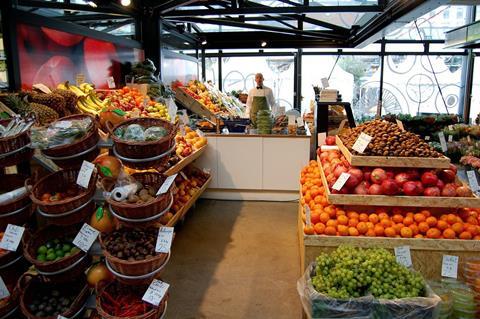Supermarkets are adopting responsibility by nudging customers to eat healthier foods and are ahead of the regulators.

I blew economic theory out of the water once. My local store was offering two bags of Kettle Chips for the price of one, and I only bought the one bag. The sales assistant looked at me as if I was mad. “But you can get a second packet for free,” he said. “But I don’t want two bags,” I replied to the bemused fellow behind the till.
You see, I knew something about myself that the retailer didn’t know. I suffer from an acute lack of self-discipline. Two bags of the said item would have been too much of a temptation.
Truth be told, we can be an irrational species. And we get influenced in ways we don’t understand.
When Dustin Hoffman was an aspiring actor, he was visited by fellow star to be, Gene Hackman. The idea was for the two of them to go out for a drink. But to fund the occasion, Hoffman asked his friend for a loan. But when Hackman looked inside Dustin Hoffman’s kitchen, he saw money piled in pots. “Why do you need a loan,” asked the actor who would later star in the French Connection? To which Hoffman explained that the pot storing money for going out was empty. To fund going out, he would have to take the money from another pot — like the rent pot, the bills pot, or the rainy-day pot.
Nudge, a book by Richard Thaler and Cass Sunstein, told the above story to illustrate a point about human nature. Dustin Hoffman knew enough about his irrationality in budgeting that he would rather borrow from a friend that from himself.
And that is why I am not an out and out libertarian. I might be stupid, but not no so stupid that I don’t realise it.
And that takes me to bogof deals. You buy one and get one free. But when was the last time you saw a bogof deal for something healthy that wasn’t about to go off?
Instead, the bogofs tend to apply to the kind of stuff we know we shouldn’t be eating or drinking.
But we are irrational animals, and we succumb — for me, that moment when I turned down the bogof deal was a rare moment of insight. I usually lack the self-discipline when out shopping to consider my lack of self-discipline at home.
Someone who is more self-aware of their shortcomings than me, or maybe someone with slightly superior forward planning capability, would never go food shopping when hungry. It is a way to nudge ourselves into more sensible buying decisions, and it’s a way that I rarely tread.
Should the supermarkets nudge us for good?
Supermarkets are good at nudging us. We know this; that is why we always buy something we don’t really need; that is why retailers invest so much money in getting the store layout just right.
But then again, ponder this. Here is a tip for selling your home. Start baking some bread before would-be purchasers are due to call. This is a well-known tactic and an example of nudging behaviour.
But should supermarkets do it the other way? Instead of nudging us to spend money on stuff we initially had no intention to buy, maybe they should nudge us into buying the kind of stuff that is good for us, even if it means fewer coffers in the supermarket tills.
Oh, why don’t you just bogof?
The British government was planning to go in for a bit of nudging itself by banning bogof deals and some advertising for unhealthy food and drinks, specifically products high in fat, salt and sugar — HFSS.
If you have a good memory, you might recall there was this virus thing, and the then British Prime Minister nearly died from it and admitted that the problem was that he was too fat.
Then the UK government had the near-impossible task of not sounding condescending when it tried to explain that one of the reasons why the UK suffered especially badly from Covid is that it has the highest obesity level in Europe.
But now, what this cost-of-living crisis, the government has elected to postpone/cancel the bogof ban. Apparently, in times of such difficulty, when households struggle to make ends meet, it would be ‘unreasonable’ to make food high in fat, salt and sugar more expensive.
Supermarkets think differently
Tesco and Sainsbury’s are doing it anyway. Tesco says it will remove multi-buy food promotions by October; Sainsbury’s is following suit.
To some, it might feel like Turkeys voting for Christmas; this is effectively businesses asking for regulation. Some might liken it to robbers asking for more cops patrolling the streets.
But this is 2022. This is the age of ESG.
Jason Tarry, Tesco UK and Republic of Ireland CEO, said: “It’s vital that we keep making the right calls on behalf of customers and communities. Customers are telling us they want to eat a more healthy, sustainable diet, but without having to stretch the weekly shopping budget.”
Mark Given, who is the chief marketing officer At Sainsbury’s, said: “We are committed to continuing to follow the government’s original HFSS promotional timelines and call on the rest of the industry to do the same.
Responsible or just good marketing
You might ask whether these retailers are doing the right thing because they like to think they are right-minded or merely applying good marketing, obeying the whims of customers?
Maybe it doesn’t matter. Let’s not examine altruistic behaviour too much; even the Good Samaritan behaved selfishly by fulfilling his need to do good.
But there is a wider point that stretches beyond the realm of philosophy.
Not everyone liked the idea of the HFSS ban; they saw it as an example of the nanny state. Such arguments are not dissimilar to those put forward against ESG
But the nuance is missed. If Tesco and Sainsbury’s were considering what their customers wanted, they were not all holier than thou. Instead, they were simply rational capitalists.
When capitalist thinking and doing the right thing converge, things get interesting. Those who don’t like capitalism say that such a convergence is impossible. But those who consider themselves capitalists, but don’t like
ESG, don’t seem to think such a convergence is possible either. And that puzzles me.
ESG World Forum
7-8 June 2022, Park Plaza Westminster Bridge, London
Part of the Digital Trust Europe Series
ESG World Forum is a two-day, in-person event taking place as part of the Digital Trust Europe series. 2021 was widely considered “the year of ESG investing.” Given the importance society has placed on ESG issues following COP26, we are likely to see this growth trend continue throughout 2022.
ESG World Forum will bring together a range of leading ESG experts and executive speakers from a range of industries as every major company is considering ESG strategies.
FIND OUT MORE & REGISTER TODAY!


























No comments yet